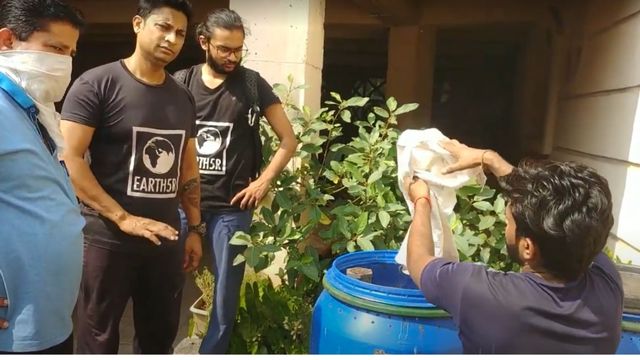Earth5R has initiated a series of Community composting initiative across India. The team has been organizing various Waste management initiatives with the help of the Earth5R App, which is available for free on Android and iPhone devices.
Mumbai, one of the world’s most densely populated cities, faces a massive challenge in managing its ever-growing waste. The city generates over 9,400 metric tons of municipal solid waste daily, and the landfills in the town are quickly reaching almost their full capacity, the city’s landfills are rapidly reaching their capacity. The open issue of lack of proper waste segregation and poor recycling infrastructure adds up to the extent of this crisis, hence community composting initiative is important.
In this context, Earth5R has launched the Community Composting Initiative in Mumbai as an organic waste management solution and a step towards a sustainable environment. As a result, it engaged over 10,500 families to segregate their waste and convert organic waste into a rich source of compost nutrient for the better management of waste. This initiative shows how much localized waste management solutions means to urban ecosystems at three levels – environmental, economic, and social.
The Growing Problem: Waste Management in Mumbai
Mumbai produces an excessive amount of waste, most of which now lies buried in enormous landfills like Deonar and Mulund. A significant portion—50-60% of this waste—is organic, comprising kitchen scraps, vegetable peels, and leftover food. Although it would be suitable for composting, much of this waste is mixed with plastics and other non-degradable materials and hence cannot be recycled.
The environmental consequences of this mismanagement are:
Methane Emissions: Landfills have organic waste undergoing anaerobic decomposition which produces methane, a greenhouse gas 25 times greater than CO₂.
Water Contamination: The leachate produced from waste pollutes groundwater and affects the health of the communities around it.
Lost Resources: Organic waste, instead of enriching the soil is being disposed of in landfills.
The government projects like Lakshya Zero Dumpsite are scientifically aiming for waste remediation and land reclamation. Unfortunately, the implementation has been slow due to logistical and financial constraints.
The Mumbai Climate Action Plan (MCAP) considers decentralization of waste processing; composting organic waste; as part of the core business in the for sustainable waste management.
In Mumbai, where space is limited, and population density is high, the need for decentralized and sustainable waste management solutions is most important. Earth5R’s Community Composting Initiative was designed to address these challenges by empowering communities to turn waste into a resource.
The Community composting Initiative: Empowering Communities Through Composting
Engaging 10,500 Families in Waste Segregation
Waste segregation is the main part of the Community Composting Initiative. Earth5R covered about 10,500 families across Mumbai through workshops and training sessions to develop awareness on differentiating between the waste kin. They learned how to segregate kitchen scraps so that compost could be kept free from contamination and remain pure with the waste management solutions through the programme.
This was an important step as improper segregation leads organic waste into disposal areas with non-recyclables like plastics, completely making it impossible to compost. Earth5R provided such families with provisions, including bins and a how-to guide. This created the foundation for large-scale composting by preparing a culture of waste segregation.
Composting Solutions Customised for Every Household
Earth5R recognized that a one-size-fits-all approach wouldn’t work for a city as diverse as Mumbai. That is why this program offers, on the ground level, three possible composting solutions to allow families and residential buildings to choose what works best for them:
- Compost Pits:
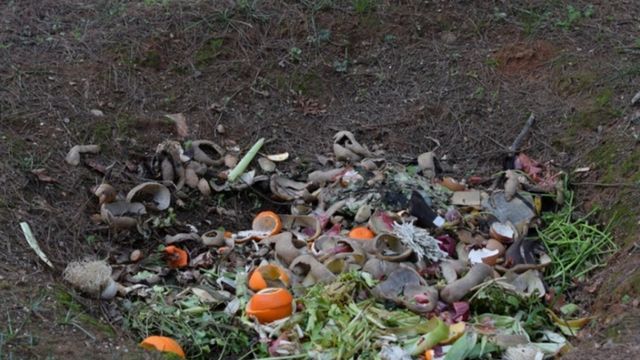
Many residential buildings constructed composting pits, where organic waste was left to decompose naturally. Pit composting is perhaps the easiest way to dispose of organic waste – it takes minimal effort, and gives high-quality manure.
- Manual Composting with Drums and Tumblers:
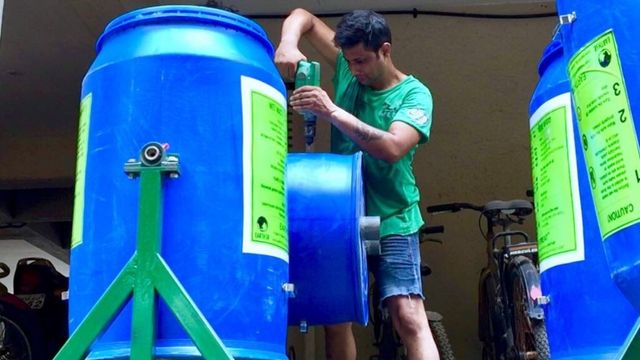
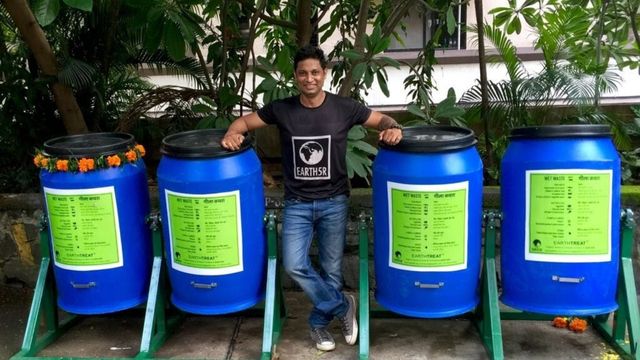
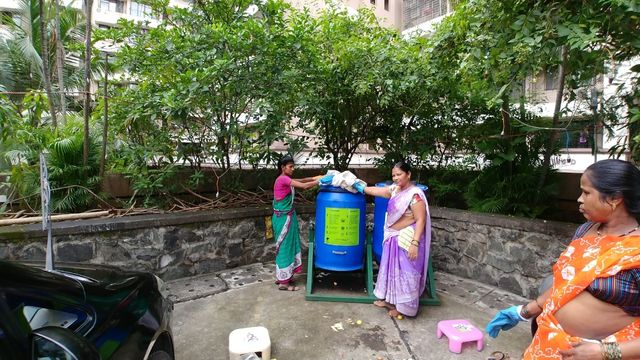
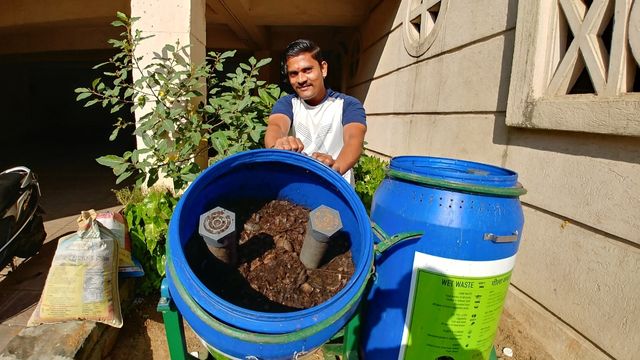
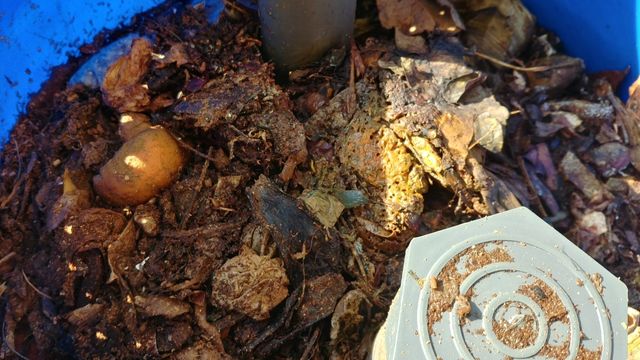
Approximately 4,500 families adopted manual composting methods, using drums or tumblers to aerate and decompose organic matter.. In this type, organic materials are aerated and decomposed within limited spaces. Residents need to manage the whole process of composting by active participation. These solutions were ideal for buildings with limited space.
- Automated Composting Units:
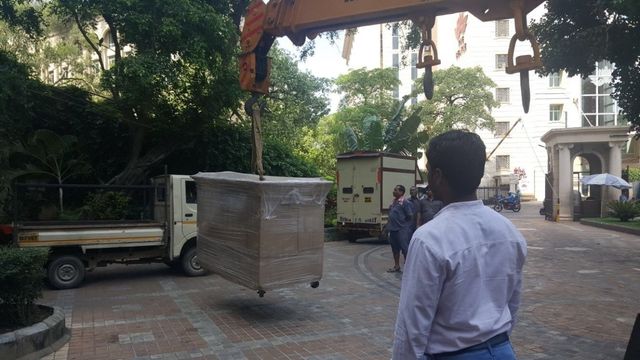
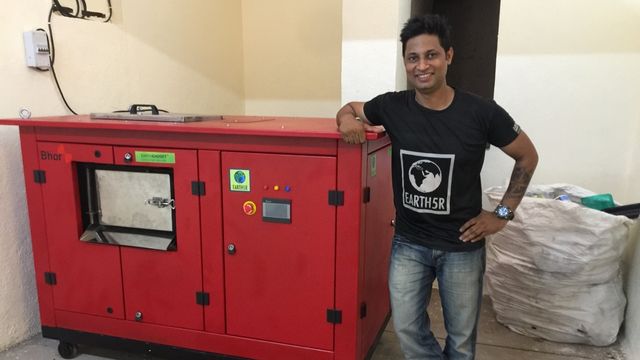
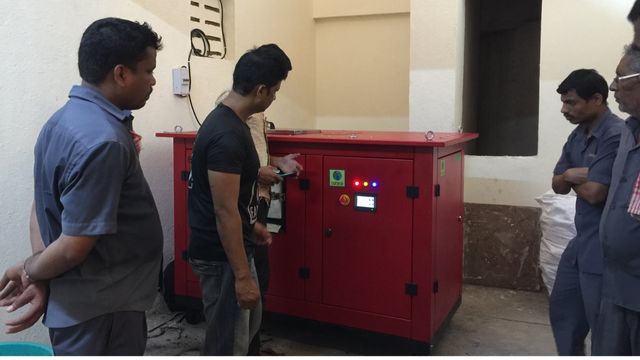
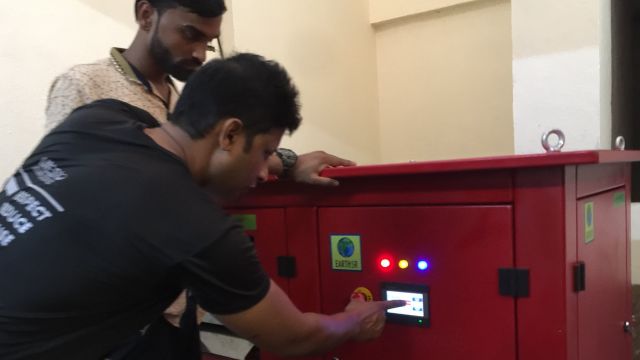
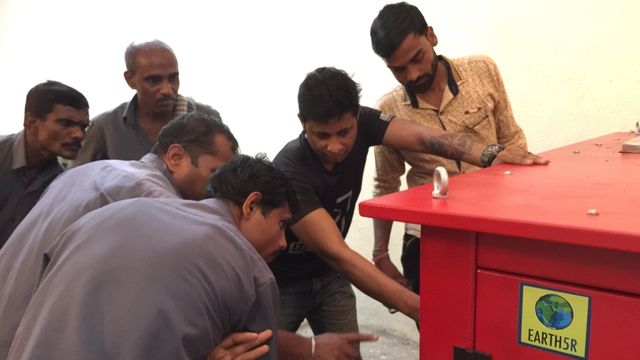
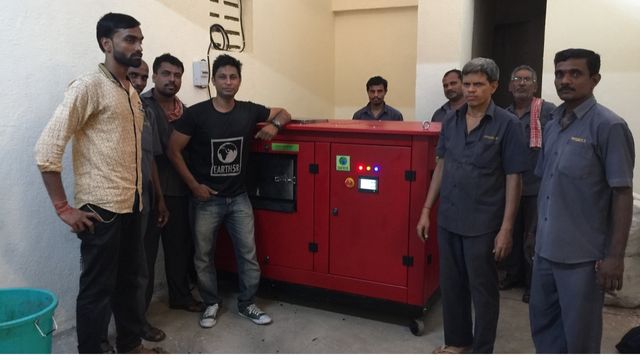
Earth5R installed automatic composting units for larger buildings and housing complexes to process the organic waste matter into compost within 24 hours, making it the easiest and most economical way to produce compost. Buildings using these automated units processed hundreds of kilograms of organic waste every day.
By offering a range of options, Earth5R ensured that communities of all sizes and capacities could participate in the program.
The Impact of the Community Composting Initiative:
The success of Earth5R’s initiative lies in its measurable outcomes. Let’s break down the numbers:
Organic Waste Managed
| Daily | Monthly | Annual | |
| Waste Generated | 0.5 kilograms of organic waste | 157,500 kg | 1.89 million kg |
| Compost output | 50 grams | 15,750 kg | 189,000 kg |
This compost was used by residents for gardening, urban farming, and soil enrichment, significantly reducing the need for chemical fertilizers.
Environmental Benefits Community Composting Initiative:
Reduction in Methane Emissions: By diverting 5,250 kilograms of organic waste daily from landfills,the project has substantially reduced methane emissions. Methane has a potential to cause global warming 25 times greater than CO₂, composting serves largely for climate change mitigation.
Carbon Offset: The program also reduced the carbon footprint of transporting waste to landfills. Because waste management has been brought close to the community, energy savings and the reduction of emissions from such centralized waste systems were also achieved.
Behavioral Change:
Earth5R did not limit its initiative to composting, it brought behavioral change in the wider community. The participatory intervention caused families to be more aware of the waste they generate and dispose of. A reduction in overall waste generation was found, improved composting within families, and even other communities being inspired to adopt such practices.
This behavioral change extended beyond the families directly involved, creating a ripple effect across Mumbai. The schools, local businesses, and other residential complexes expressed intent to organize in much the same way.
Economic and Social Benefits:
Cost Savings: The buildings managed waste at the site thus saved on waste disposal costs,while individual families used organic compost instead of chemical fertilizers.
Job Creation:The program has also resulted in the creation of work opportunities for waste workers trained by Earth5R for managing and monitoring composting systems. It also improves waste management practices and supports livelihood.
Extending the Initiative:
Encouraged by the success of the Community Composting Initiative in Mumbai, Earth5R plans to extend this initiative to other cities in India. The organization intends to involve 100,000 families by 2030, thus bringing about a national transformation of urban waste management. Earth5R sees the future where composting communities are the networks and organic waste is a resource and never a burden.
Earth5R’s Community Composting Initiative in Mumbai showcases the power of collective action. It engaged 10,500 families into making this program divert significant amounts of waste into the land and thus become a sustainable urban waste management model.The initiative’s success lies in its combination of education, technology, and community participation acts in showing that something really small can, when combined, create huge blessings in the environmental, economic, and even social spheres.
As cities around the world deal with waste management challenges, Earth5R’s model serves as an inspiring example of how communities can come together to turn waste into wealth. The great composting revolution of Mumbai shall surely inspire the rest of the world toward a brighter and more sustainable future.
Want to join the movement?
Get in touch with Earth5R today to bring the composting revolution to your community!

